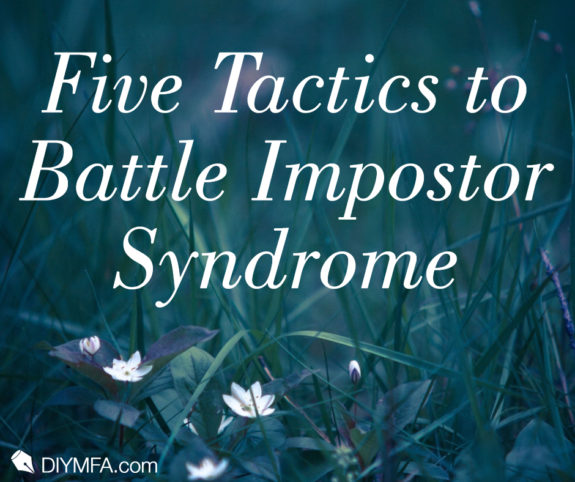Many writers, especially those early in their careers, suffer from impostor syndrome: the persistent feeling that one is fraudulent and doesn’t belong in one’s chosen field, and it’s only a matter of time before the world uncovers that fact. Such feelings can be magnified if you’re self-publishing. Without the external validation of an agent choosing to represent you or an editor choosing to publish your manuscript, it can be harder to convince yourself you’re actually a writer.
This is silly, of course–writers are people who write–but the feeling is nonetheless real. So how do self-publishing authors cope with this problem? Where do they find validation that can reassure them in the tough parts of writing and revision?
Here are a few suggestions.
Avoid drawing comparisons
In indie publishing (as in all of life, really), you are running your own race, and comparisons are irrelevant. Cozy mystery author Laura Durham observed, “After working in the wedding industry, which is super competitive and a little snarky, I learned to keep my head down, not worry too much about what everyone else was doing, and focus on doing the best I can with my talents (and continually work on improving). I’d rather spend an hour working on craft than an hour fretting or doubting myself.”
Romance author Maria Luis concurs. “Always remember to stay in your own lane. You will have friends who soar beyond your wildest imaginations; you will also have friends who look at your success and wonder, ‘How are they doing all that?’ Every person has imposter syndrome. Every person has self-doubt. But every person is walking the path they’re meant to be on. Enjoy the good moments. Learn from the bad. And never forget that you are living your dream–everything else will always settle into place.”
Focus on your readers, rather than yourself
Mystery and middle-grade author Alexandra Amor advises indie authors that a mindset of serving the reader helps draw the focus away from yourself. “My first book was a memoir about ten years I spent in a cult in the 1990’s, so when I was feeling self-critical or doubtful I would try to shift my focus away from myself and onto the people who would be reading the book. I tried to spend more time thinking about helping those readers and less time thinking about how my writing might be judged. Now that I’m focused on writing mystery novels, I apply the same strategy and try to think mostly about satisfying the reader and as little as possible about myself.”
Don’t try to please everyone
If you can avoid thinking about how other people judge your work, that’s terrific. They’re still going to judge it, though. That’s part of the deal. But even if you can’t avoid thinking about it from time to time, you don’t have to wallow in it. “The one thing a writer can never avoid is readers who don’t like your work, for whatever reason,” Laura Durham acknowledges. “I’ve definitely gotten nasty reviews, and even some accusing me of being immoral because I have gay characters in my books! I just remind myself that even the bestselling books in the world have bad reviews. When you get your first one-star review, check out the one-stars on famous books like Harry Potter and even To Kill a Mockingbird. It just goes to show that you can’t make everyone happy, trying to do that is a losing game, and finding your specific tribe is key.”
Look to your mailing list
Who, exactly, constitutes that specific tribe? The people on your author mailing list, for starters. Whether your list is large or small, take comfort from this group of people who’ve had to jump through some hoops (like double opt-in) in order to say, “I want to hear more about you.” If you need a boost, reach out to them in a quick message. Ask a question you genuinely want to know about your readers and when the responses come in, continue that dialogue. This process of building relationships with your biggest fans is the less-visible part of the task of serving your readers, but it’s nonetheless important. These people support you and want to see you succeed. Take care of them, and they’ll take care of you.
Think about your long-term vision
There are very, very few overnight successes. Most success stories don’t show the months and years of practice of both writing craft and marketing skills that build expertise in publishing. Go back to your SMART goals and see how you’re doing. Sometimes recommitting to those goals, or checking in and discovering you’ve actually achieved them ahead of time, is all the boost you need.
In a related vein, Maria Luis lives by advice on goal setting she heard it from bestselling romance author Staci Hart at the Indie Tea conference. “Although she was speaking in terms of new releases, I truly believe that her words can be applied to any moment within working as an indie author. First, what is your goal? Think big picture, the magical, unicorn moments. Write it down. Second, what are your actual expectations? Whether it comes down to release sales, backlist ROI, reader engagement for a new newsletter, etc.–what do you actually expect to happen based on the work you’ve done, and the stats you’ve seen thus far? Write this down too. Third, what is the base minimum that needs to happen for you to continue on this journey? Be honest with yourself. Also write this down.
With every release, I still write down my three answers to these questions. At the start of the year, when I’m planning my goals for each quarter, I do the exact same thing. It allows me to keep a level head while still reaching for the stars. If there’s one person I could hug for helping me to keep my head on straight, it would be Staci Hart. I’ve never forgotten this bit of advice and I don’t think I ever will.”
Alexandra Amor echoes the need to focus on the long-term, as well as the helpful attention to craft. She says she doesn’t try, “to be perfect. That’s not easy, but I think it’s really important. I believe that as artists we should give ourselves permission to grow and improve and we can only do that if we complete a project, send it out into the world, as scary as that might be, and then start the next one. Perpetually working on perfecting one book is a trap many writers fall into, but in my opinion that strategy inhibits development of craft.”
Take heart: for many indie authors, impostor syndrome lessens over time. Perhaps it’s because controlling your publishing pathway leads to a sense of empowerment, or perhaps it’s because indie authors tend to build close relationships with their readers and those relationships reinforce the notion that the writer is creating something of value to others. But if you’re doubting yourself now, remember that if you’re still writing, you’re not an impostor. You cannot be. Writers are people who write.

Helen J. Darling writes contemporary women’s fiction. Her first novel, I’ll Know Me When I Find Me, was self-published in January 2018. Her follow-up novel, Terms and Conditions, will be published in November 2019. You can connect with her at itshelendarling.com and on Instagram at @itshelendarling.







